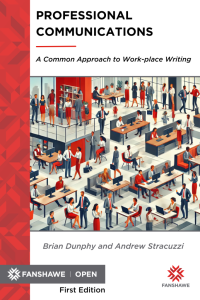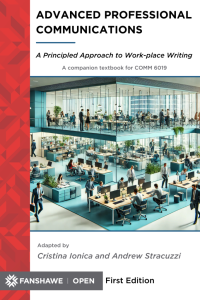Professional Communications Courses (COMM)
What are Professional Communications Courses?
Communicating professionally in any industry, in any role, at any level is the most critical skill a student will develop in beginning and building a career. Whether through the Canadian Labour Board or job search sites such as Monster.ca, statistics confirm this. Our community employers confirm this.
Writing clearly, concisely, and coherently (without error) across all business writing (letters, emails, job packages, reports, etc.) and presenting information professionally can make the difference between a hire and a fire, a promotion and a demotion.
Our job is to prepare students with the professional communication tools required to help launch them into the world of work. I often tell my students that this is the most critical course they will take from a future employment perspective.

Meet your Coordinator
Brian Dunphy
Email: bdunphy@fanshawec.ca
What do you need to know about teaching a Professional Communications course?
- Resources exist – fellow professors, shared portal resources, Course Leaders, and COMM coordinators.
- Business writing differs from academic writing in style, format, and often tone. As well, levels of writing skills can vary wildly from one class to another, and you may choose to spend more time on grammar review types of ‘discretionary’ assignments.
- Plagiarism is on the rise. Ensure that EVERY assignment goes through Turnitin. You may need to spend more time on this depending on class makeup (e.g. Some international students come from a very different academic culture where copying others’ work is the norm).
- The course is sometimes/often met with resistance by students; emphasize importance & relevancy from day one!
- The course can be a lot of ‘fun’ (for both students and profs) in that it is current, relevant (that word again), and allows for a lot of personal tailoring on the part of professors to make the course suit their delivery style.
You can find some helpful links later in the Professional Communications area of this course.
- COMM Resource Course in FanshaweOnline – This resource course houses helpful information and materials for your use. If you are teaching COMM and need access, please get in touch with your Coordinator or your EST.
COMM OER Textbooks
Most “Common” communications courses have adopted the following OER textbooks. If you are teaching a COMM course that is not considered a “Common COMM,” please contact your Coordinator for more information about textbook-specific use.
| Common COMM Text
Professional Communications: A Common Approach to Workplace Writing |
Advanced Professional Communication Text
Advanced Professional Communication: A Principled Approach to Workplace Writing |
Ideas from Instructors

- “Pay it Forward” – it is expected that if anyone has kindly shared any course content with you that, in turn, when you create course content, you will also share it with others…this can be done through the Fanshawe COMM site or by sending material to the COMM Coordinator for uploading.
- Relevancy — Make the course relevant to the students’ programs. This means that tailoring assignments to specific programs is essential. You do not need to be a program expert (e.g. Accounting, IT, etc.); however, it is expected that you will have an understanding of the program/industry so that you may relate the course and yourself to the students (go to the Fanshawe website and search the program to give you a general understanding of what students will be learning if needed). Students often struggle with or resist the need for this course, and it is our job to ensure they understand the importance. Tailoring goes a long way in accomplishing this.
- A general tip is to get to class 5-10 minutes before class begins to set up. And remember that classes are only 50 minutes!
- Ensure you are familiar with the academic offence process (Contact the Coordinator if you have any questions).



